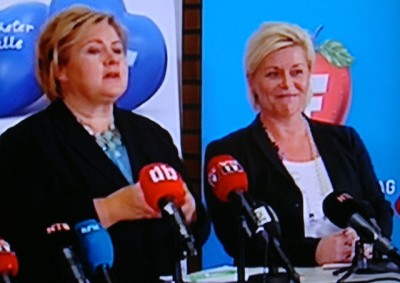NEWS ANALYSIS: There’s been a sudden surge of voter support for Norway’s two government coalition parties during the past week, just as both fend off calls for Norway to take in an additional 10,000 Syrian refugees. That’s likely no coincidence, and the surge may signal a shift in the political winds ahead of local elections this fall.

First came a poll conducted for newspaper Dagens Næringsliv (DN), showing jumps in voter support for both the Progress Party and the Conservatives, while Labour took a dive. That poll was taken after Labour joined several small parties’ calls to take in 5,000 more Syrian refugees this year and 5,000 next year. Most of the small parties lost ground, too, while the Conservatives jumped after they refused to heed the call for more refugees. The Progress Party has opposed it all along, calling instead to aid refugees where they are.
Then came a second poll conducted by TNS Gallup for TV2 that confirmed DN’s numbers: After months of rising in the polls, Labour fell 4.6 percentage points to hold 35 percent of the vote, well below last winter’s polls showing Labour over 40 percent. The Conservatives, meanwhile, gained 3.9 points to claim 26.5 percent of the vote and reclaim the level that led to their election victory in 2013. Their coalition partner jumped 2.5 points, with the Progress Party landing once again back over 11 percent of the vote. That’s below its election victory level of 16.3 percent in 2013, but it marks a reversal of the party’s slide since.
Winds blowing from left to right
Two polls showing nearly the same numbers and exactly the same tendency indicate that the political winds are no longer blowing in favour of Labour. The polls can also explain why Labour leader Jonas Gahr Støre is now showing signs of being willing to compromise on the refugee issue. He noted that his party voted at its annual national meeting two weeks ago to pressure the government into accepting 10,000 Syrian refugees to be sent by the UN, “but we want to settle on a broad solution in the Parliament,” he told reporters on Tuesday.
A meeting among all the parliamentary leaders Tuesday afternoon failed to reach any conclusions. They instead agreed to start negotiating the refugee numbers on May 19, after the government releases its revised state budget. “That will give us a better basis for conversations,” Støre said.
Veteran political commentator Arne Strand wrote in newspaper Dagsavisen on Wednesday that the sudden surge of support for the government parties, and loss of support for Labour, may be tied to how conflicts have eased between the coalition and its support parties following controversy over last year’s state budget proposals and the controversial deportations of rejected refugees with children (the so-called asylbarn issue).
Links to immigration skeptics
More likely, Strand suggested, the government is gaining on what he called “underlying skepticism” towards immigration in Norway. As much as Norwegians seem eager to help refugees, Strand pointed out that election research has documented that Norwegian voters are in general wary of immigration. That’s most pronounced among Progress Party supporters, but many voters clearly have fled Labour after it joined the call to accept 10,000 refugees from Syria. Worries abound over how Norway, despite its wealth, can assimilate refugees and integrate a wave of other immigrants into society. More than 5,000 refugees already in Norway and approved for permanent residence are still living in asylum centers, waiting for resettlement in Norwegian towns and cities. The government parties aren’t the only ones concerned that 10,000 more will pose a major challenge.
Another poll this week by state broadcaster NRK suggested that the Syrian refugee issue has split the Norwegian population. Only a scant majority (51 percent) agreed that Norway should take in the 10,000, while others argue (in line with the government) that Norwegian resources would be better spent by sending more emergency aid to refugees where they are, in their home countries or in overburdened refugee camps.
Labour has, at any rate, likely lost voters over its stand on the refugee issue, while the government parties have gained. Those who moved from the conservative side over to Labour last fall and winter seem to have drifted back to the conservative coalition. At least one party seems to be standing firm on its demand to take in more refugees, the Christian Democrats, which has been one of the government’s support parties in Parliament. They’re heading into their own annual national meeting this weekend and haven’t wavered on their humanitarian call to help the refugees, by both welcoming 10,000 and boosting aid to them abroad. “That’s more important than our government cooperation,” the leader of the Christian Democrats’ youth group told DN on Wednesday, no matter what the polls suggest.
newsinenglish.no/Nina Berglund

